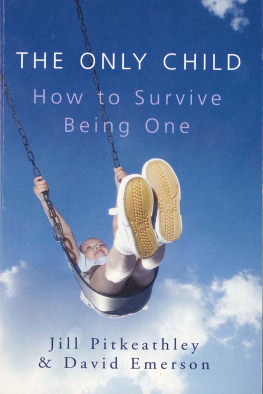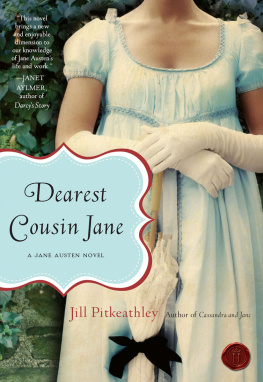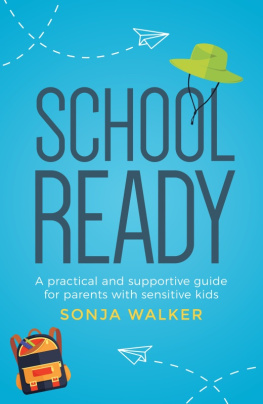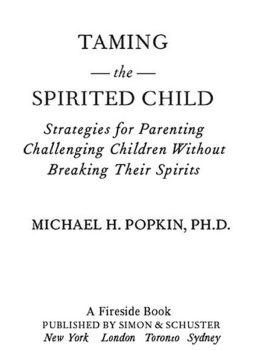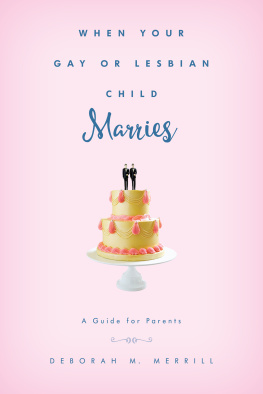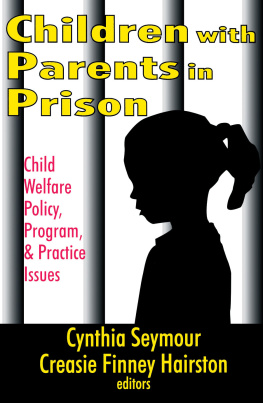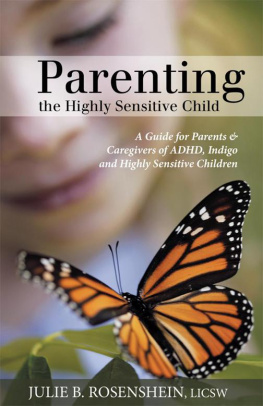
By the same authors
ITS MY DUTY, ISNT IT?
The Plight of Carers in Our Society
by Jill Pitkeathley
AGE GAP RELATIONSHIPS:
The Attractions and Drawbacks of Choosing a Partner Much Older or Younger Than Yourself
by Jill Pitkeathley and David Emerson

Copyright Jill Pitkeathley and David Emerson 1994
The right of Jill Pitkeathley and David Emerson to be identified as authors of this work has been asserted by them in accordance with the Copyright, Designs and Patents Act 1988
First published 1994 by Souvenir Press Ltd, 43 Great Russell Street, London WCIB 3PA and simultaneously in Canada
Reprinted 1994, 1997, 2005, 2011
All Rights Reserved. No part of this publication may be reproduced, stored in a retrieval system, or transmitted, in any form or by any means, electronic, mechanical, photocopying, recording or otherwise without the prior permission of the Copyright owner.
ISBN 978 0 285 63148 9
Photoset by Rowland Phototypesetting Ltd, Bury St Edmunds, Suffolk
Printed and bound in Germany by Bercker
ACKNOWLEDGEMENTS
We planned this book for some years, since David first thought of the idea. We are grateful to all those people who have since listened patiently, helped us with suggestions and given encouragement. We thank Simon and Rachel for all weve learned from them and our friends for letting us test out our ideas. Most of all, we want to record our deepest gratitude to all those only children who so generously shared their time and their feelings with us, and whose words we quote extensively. For the sake of anonymity their names have been changed, but we know who they are. We are extremely grateful to them all.
Since the book was first published we have received a number of moving letters. We said that we wanted to reach people who felt that the experience may be relevant to them and whom it may help to understand themselves better.
I thought, as so many of your interviewees obviously did, that my feelings, responses and world-view were a result of the unique condition of my upbringing. It has been a revelation and a liberation to discover that I do, at last, belong to a group which shares characteristics and experiences. Letter, 1996
This is what we have done - we are glad to know it did mean something to many who have read the book to date.
J ILL P ITKEATHLEY and D AVID E MERSON
A selection of comments from the many letters we have received since publication
I have just finished reading Only Child which I found absolutely unputdownable. I was quite amazed how the analysis fitted my character and development on almost every score. Hours and hours of psychoanalysis could not have produced the self-revelation which your book has done.
Ive just read your excellent book. The extent to which the descriptions apply to me as an only child is remarkable: if I was paranoid, Id say that youd been spying on me! Im sure that the book will help me in overcoming problems that I face in my life.
I found your book a revelation. So many aspects of my personality and the way I am, which I previously thought were peculiar and problematic, turn out to be common among only children. You have explained me to myself and made me much more confident in stating my needs - now I know they are real needs (because of my upbringing) rather than oddities to be suppressed.
It was a brilliant book and I am sure I am not alone in saying that it has helped me to change my life. I recommend it to as many other only children as I can.
The sense of relief is enormous. I laughed aloud with recognition time after time... Your book is all so true. I shall recommend it to every only child I meet. I have read a number of self-help books. Yours is really outstanding and I congratulate and thank you for it. I feel quite normal, for the first time in my life.
Writers names and addresses withheld for reasons of privacy.
CONTENTS
Teenage rebellion
10 The Only Child as Carer
Introduction
Only children are distinctively different from all other children. Not worse, not better, but different. This book describes those differences.
We believe this distinctiveness has not been set out before. The popular image of the spoilt, selfish, self-centred but successful only child is far from being the complete picture. Of course, first-born, middle and youngest children have their differences too, but this book isnt about them. This is, in fact, the first one to draw entirely on the experience of only children themselves, to analyse what it is like to be an only child, how it affects you and how you can use the experience more positively.
We have interviewed sixty-plus only children in depth about their background, childhood, schooling, relationships, careers and many other aspects of their lives. From this we now know that being an only child is most definitely a special and very different childhood experience. It has great gains - of parental love and attention amongst others - as well as great losses, especially absence of sharing with other children. And the only children we interviewed had strong views about it:
I get very irritated at the tired old stereotypes about only children. They are not necessarily doted on or spoilt any more than other children. Conversely, they are not freaks to be pitied. Nor is onlyness a reason for a youngster or an adult having behaviour problems. All the stereotypes are insulting assumptions. But our experience is different and that makes us special. I wish the world would realise that.
Childhood without siblings leaves a legacy of burdens which present themselves as problems with far greater force in adult life than ever they do in childhood. As our interviews reveal, there are unique pressures and responsibilities for the adult only child. Most certainly, all is far from rosy behind the assured and confident exterior that only children usually present to the world.
But if it is so different, why hasnt the only-child experience been identified before? Perhaps because only children themselves have rarely recognised how much the way they behave in relationships, and socially, stems from being an only. They tend to feel any odd behaviour as just part of their own identity - after all, theyve never had a brother or sister against whom they could check out their reactions:
Its hard to explain the total ignorance of any other child in growing up.
And where behaviour is noticed by others, its often defined in terms of the spoilt, selfish only child image. Only as an adult will an only child spot another at a party, and perhaps laugh with him or her at a shared trait.
A constant feature throughout our interviews has been the surprise of interviewees that what they had just described to us as an individual experience from their own upbringing was one we had heard from many other single children. In having no other siblings with whom to share recollections of childhood, the only child has not been in a position to recognise a common experience:
If I had to live my life again I would not wish to come back as an only child. Id never wish it on anybody. Im not saying its dreadful, because it wasnt. But I just wish Id recognised earlier what the effect of being an only child is.
This book aims to help with that recognition. Early childhood is the most influential period of our lives, when fundamental character is set. Indeed, whatever your situation was at this time - whether a first-born, middle, youngest or only - it will have had an influence on your adult life. The issue is not
Next page
